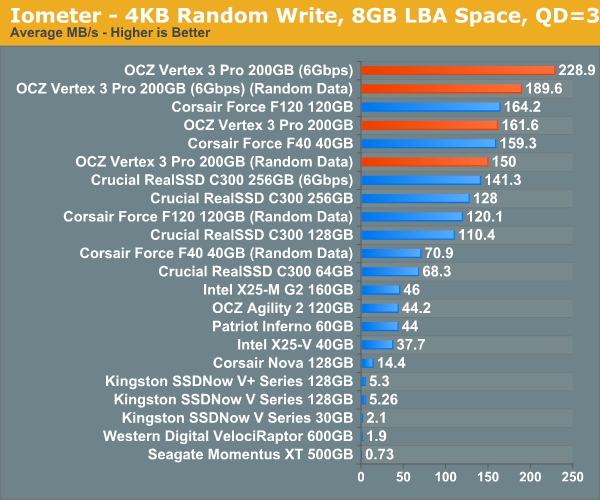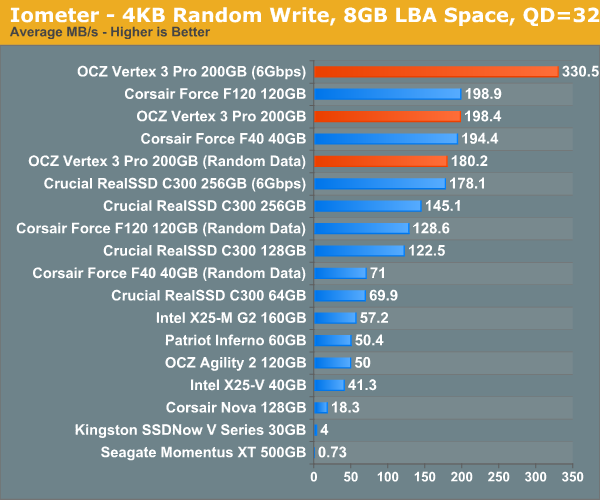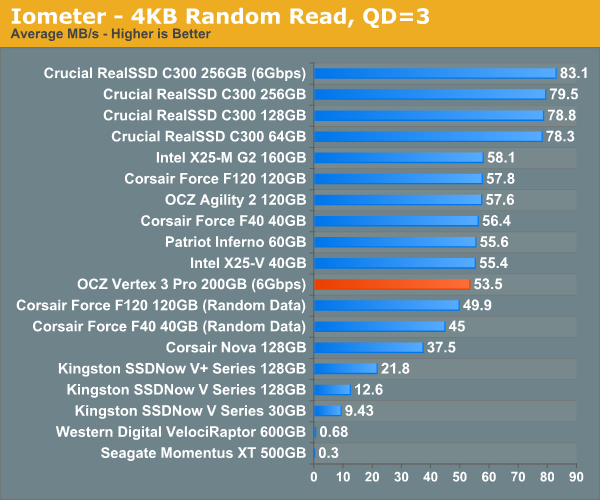OCZ Vertex 3 Pro Preview: The First SF-2500 SSD
by Anand Lal Shimpi on February 17, 2011 3:01 AM ESTThe Test
Note that I've pulled out our older results for the Kingston V+100. There were a couple of tests that had unusually high performance which I now believe was due the drive being run with a newer OS/software image than the rest of the older drives. I will be rerunning those benchmarks in the coming week.
I should also note that this is beta hardware running beta firmware. While the beta nature of the drive isn't really visible in any of our tests, I did attempt to use the Vertex 3 Pro as the primary drive in my 15-inch MacBook Pro on my trip to MWC. I did so with hopes of exposing any errors and bugs quicker than normal, and indeed I did. Under OS X on the MBP with a full image of tons of data/apps, the drive is basically unusable. I get super long read and write latency. I've already informed OCZ of the problem and I'd expect a solution before we get to final firmware. Often times actually using these drives is the only way to unmask issues like this.
| CPU |
Intel Core i7 965 running at 3.2GHz (Turbo & EIST Disabled) Intel Core i7 2600K running at 3.4GHz (Turbo & EIST Disabled) - for AT SB 2011 |
| Motherboard: |
Intel DX58SO (Intel X58) Intel H67 Motherboard |
| Chipset: |
Intel X58 + Marvell SATA 6Gbps PCIe Intel H67 |
| Chipset Drivers: |
Intel 9.1.1.1015 + Intel IMSM 8.9 Intel 9.1.1.1015 + Intel RST 10.2 |
| Memory: | Qimonda DDR3-1333 4 x 1GB (7-7-7-20) |
| Video Card: | eVGA GeForce GTX 285 |
| Video Drivers: | NVIDIA ForceWare 190.38 64-bit |
| Desktop Resolution: | 1920 x 1200 |
| OS: | Windows 7 x64 |
Random Read/Write Speed
The four corners of SSD performance are as follows: random read, random write, sequential read and sequential write speed. Random accesses are generally small in size, while sequential accesses tend to be larger and thus we have the four Iometer tests we use in all of our reviews.
Our first test writes 4KB in a completely random pattern over an 8GB space of the drive to simulate the sort of random access that you'd see on an OS drive (even this is more stressful than a normal desktop user would see). I perform three concurrent IOs and run the test for 3 minutes. The results reported are in average MB/s over the entire time. We use both standard pseudo randomly generated data for each write as well as fully random data to show you both the maximum and minimum performance offered by SandForce based drives in these tests. The average performance of SF drives will likely be somewhere in between the two values for each drive you see in the graphs. For an understanding of why this matters, read our original SandForce article.

Random write performance is much better on the SF-2500, not that it was bad to begin with on the SF-1200. In fact, the closest competitor is the SF-1200, the rest don't stand a chance.
Many of you have asked for random write performance at higher queue depths. What I have below is our 4KB random write test performed at a queue depth of 32 instead of 3. While the vast majority of desktop usage models experience queue depths of 0 - 5, higher depths are possible in heavy I/O (and multi-user) workloads:

Ramp up the queue depth and there's still tons of performance on the table. At 3Gbps the performance of the Vertex 3 Pro is actually no different than the SF-1200 based Corsair Force, the SF-2500 is made for 6Gbps controllers.











144 Comments
View All Comments
abrar - Friday, February 18, 2011 - link
"In this particular drive the user (who happened to be me) wrote 1900GB to the drive (roughly 7.7GB per day over 8 months) and the SF-1200 controller in turn threw away 800GB and only wrote 1100GB to the flash. This includes garbage collection and all of the internal management stuff the controller does."how did you calculate this data ?
have you used any special software?
douglaswilliams - Friday, February 18, 2011 - link
Anand,Will these very fast read rates speed up virus scans?
Thank you for being technical and thorough,
Douglas
Qapa - Saturday, February 19, 2011 - link
ALL disk reads are this fast, so of course this will have an impact in virus scanning.But mostly, it will have an impact that your system is faster, although those resource hogs (virus scanning programs) are running - and yes, their bottleneck were reading the files from the disk.
semo - Saturday, February 19, 2011 - link
I've noticed that MSE is mostly limited by CPU and it isn't multithreaded so even worse notebooks where the CPU freq. might be lowerjoeld - Friday, February 18, 2011 - link
I don't believe any of the SF-1200 makers actually supported encryption on the drive, so the password was basically blank. Are the folks bringing the SF-2500 to market actually going to support disk passwords so that full-disk encryption requirements for laptops will be met? Software based full disk encryption is just too slow and flawed when paired with SSD drives...faster - Saturday, February 19, 2011 - link
Props to OCZ for leading the performance market on multiple levels.Looking at the prices of these new high performance SSDs, including the upcoming offerings from Intel, the OCZ Revodrive X2 is looking like a value. With Revodrive's read/write of 740/720, even this next generation of drives doesn't even come close. Now that newegg sells the 240GB x2, on sale, for $540 ($679 not on sale), it is a better bang for the buck than the new drives. The revodrive is a product that has been out for a while and is available right now. If you have the open PCIe slot, it seems like a no-brainer to pick the X2.
croc - Sunday, February 20, 2011 - link
Sadly, (well maybe not so sadly) we Aussies are not allowed gun ownership. There are exceptions, but generally not... So the final conclusion, "2011 may be the year to finally pull the trigger." does not really apply. However, maybe the right year to finally purchase an SSD, time (and further testing) will tell.MamiyaOtaru - Monday, February 21, 2011 - link
time doesn't "tell" anything. It's an abstract concept. I mean if you're going to take issue with idioms..Qapa - Sunday, February 20, 2011 - link
It would also be interesting to have in the benchs:- 1 "normal" 7200 HDD
- 1 "normal" 5400 laptop HDD
This would be interesting to compare since, most people do not own Velociraptors and this way we would be able to better know the system improvement on buying an SSD, and convincing other people - like our bosses - to upgrade our computers at work as well :)
compvter - Monday, February 21, 2011 - link
@faster Thats because they have two (old) sf controllers in the card. Think about the speeds they get with two of these (sf-2000 family) i would guess it will be around 1GB/s (read&write). At least current revodrives lack trim support so, that might be deal breaker for some ppl.